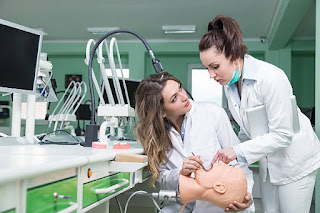Dental courses in India have grown in prominence and popularity as a result of the large number of dental clinics and students that pursue them. These courses were not as popular in the 1990s as they are now, indicating that Dental Courses In India have become more important. Dentistry is a medical specialty that focuses on evaluating, diagnosing, preventing, and treating diseases, disorders, and ailments of the mouth's soft and hard tissues. Dentists are medical professionals who specialize in dentistry. Dentists and dental surgeons treat oral and dental problems and diseases using surgical, medicinal, and other methods. They treat patients with a number of treatments and procedures, including filling, crowning, and scaling teeth, extracting teeth, treating gum disorders, and fitting artificial substitutes.
Eligibility Criteria for Dental Courses
To pursue an Undergraduate course, candidates must have completed their 10+2 from a recognised board with a minimum aggregate. For PG courses, one must have completed their undergraduate degree from a recognised board or university. For Doctorate Courses, you must have a minimum of a PG from a recognised board or university.
Dentistry Courses Admission Procedure
Admission to dental school is granted based on their success on entrance exams. Some colleges will admit students based on their performance in the 12th grade.
Dentistry's specialist fields include the following:
Orthodontics is the field of dentistry that focuses on straightening and aligning teeth and jaws.
Periodontics is a branch of dentistry that focuses on gum health and illnesses.
Endodontics, or Operative Dentistry, deals with root canals, fillings, and cosmetic surgery.
Prosthodontics is the practice of creating artificial teeth.
Oral and Maxillofacial Surgery is concerned with procedures involving the mouth and jaw.
Pediatric dentistry is concerned with the treatment of children who have oral issues.
Oral pathology is the study of diseases that affect the mouth and its diagnosis.
Content of Dentistry Courses
All or some of these are studied in this discipline —
Anatomy.
Physiology.
Biochemistry.
Pharmacology.
Microbiology.
Practical instruction.
Objectives of Dentistry Courses
- To achieve perfect dental competency.
- To establish high standards of practice and serve as an example to others.
- To provide world-class facilities and cutting-edge dental technology.
Basic Dentistry Course Requirements
Candidates who have completed 10+2 with at least 50% marks in Physics, Chemistry, and Biology are eligible for admission to the Bachelor of Dental Science (BDS) programme. A Bachelor's degree in Dental Science is required to practise as a dentist (BDS). At the bachelor's level, there are no specializations. If you wish to advance in your career, you must be an expert with a Masters (MDS) degree.
Admission to dental graduate programmes is determined by a nationwide competitive test. The CBSE conducts an All India Pre-Medical/Pre-Dental Entrance Exam for both the MBBS and the Bachelor of Dental Sciences (BDS) programmes. Institutions are assigned depending on their merit. Aside from the government sponsored medical colleges, most states have at least one dentistry college, with admission based on residency. However, in order to practise dentistry, one must ensure that the course they choose has been approved by the Dental Courses In India.
Career Prospects Following Dental Courses
Dentistry is a lucrative industry because people with dental problems are plentiful. Teeth are affected by a sedentary lifestyle and a busy schedule. As a result, seeing a dentist becomes necessary. Dentistry is a rapidly evolving and expanding field with numerous opportunities and problems. Increased public awareness of oral health and the emergence of new fields such as periodontics (care of gums and diseases that may affect them), oral pathology (diagnosis of diseases that affect the mouth), and orthodontics (straightening and aligning teeth and jaws) have all broadened the field's scope. Models and actors require cosmetic dentistry to improve their appearance. State governments and the federal government hire dental surgeons to work in hospitals, medical institutions (teaching), and dispensaries. Dentists are employed by railways, the defense industry, banks, and public/private sector units in hospitals and medical centers set up for their personnel. In India, dentistry opportunities in private practice for both general and specialized care are plentiful (orthodontics, for example). Salaries in government and public sector hospitals are defined by scales that are available to all Class I officers; nonetheless, private practice remunerations are extremely high.




Comments
Post a Comment